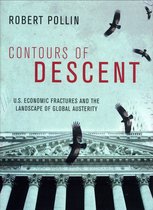Qe Trap A Hazardous Road for the World Economy
Afbeeldingen
Sla de afbeeldingen overArtikel vergelijken
- Engels
- Hardcover
- 9781119028123
- 28 november 2014
- 352 pagina's
Samenvatting
When noted economist Richard Koo's The Holy Grail of Macro-economics was published in 2008, it served as a wake-up call to Americans and Europeans about the impending balance sheet recessions. In his next-step resource, The Escape from Balance Sheet Recession and the QE Trap: A Hazardous Road for the World Economy, Koo issues a warning about the unique political and economic pitfalls that stand in the way of recovery from this rare type of recession.
The Escape examines the similarities between Japan in the past and the West today and presents the basic mechanics of balance sheet recessions. In this book, the author highlights the recent developments in the global economy and contends that the U.S. policy makers who understood the dangers of balance sheet recession steered the country away from the fiscal cliff, which is why it is doing better than Europe. However, the U.S., together with the U.K. and Japan could still face a major challenge in unwinding the quantitative easing (QE), the problematic policy byproduct of a balance sheet recession, in what Koo calls the "QE trap."
This book also examines the influence of "Abenomics" (the economic policy of the Abe administration in Japan). It offers a detailed explanation of why this policy has great potential, and if properly leveraged Japan should be able to put the long balance sheet recession and its after-effects behind it for good. The Escape also contends that the European policy makers remain unaware of the balance sheet recession concept and its dire implications. As a result, they are repeating every mistake Japan made during the last two decades including conflating balance sheet problems with structural problems. To remedy this ominous situation, Koo outlines a practical solution to the Euro problem.
On China, readers will gain a different historical perspective as Koo argues that western commentators have forgotten their own history when they talk about rebalancing of the Chinese economy.
Richard Koo's warnings about the balance sheet recession were prescient in forecasting the 2008 economic collapse and the slow recovery thereafter. Now, The Escape offers Western nations an opportunity to develop a clear understanding of the economic problems they face today and details a solution for overcoming their predicament in order to return to economic normalcy.
Compare global experiences during the balance sheet recession and find out what is needed for a full recovery
The Escape from Balance Sheet Recession and the QE Trap details the many hidden dangers remaining as the world slowly recovers from the balance sheet recession of 2008. Author and leading economist Richard Koo explains the unique political and economic pitfalls that stand in the way of recovery from this rare type of recession that was largely overlooked by economists. Koo anticipated the current predicament in the West long before others and issued warnings in his previous books: Balance Sheet Recession and The Holy Grail of Macroeconomics. This new book illustrates how history is repeating itself in Europe while the United States, which learnt from the Japanese experience, is doing better by avoiding the fiscal cliff. However, because of the liberal dosage of quantitative easing already implemented, the United States, the United Kingdom, and Japan may face a treacherous path to normalcy in what Koo calls the QE Trap. He argues that it is necessary to understand balance sheet recession in order to resolve the Eurozone crisis, particularly the competitiveness problems. Koo issues warnings against those who are too ready to argue for structural reforms when the problems are actually with balance sheets. He re-examines Japan's two decades of experiences with this rare recession and offers an insider view on the Abenomics. On China, readers will gain a very different historical perspective as Koo argues that western commentators have forgotten their own history when they talk about the re-balancing of the Chinese economy.
- Learn from Japan which experienced the same predicament afflicting the West fifteen years earlier
- Discover how unwinding of quantitative easing will affect the United States, the United Kingdom, Japan, as well as the emerging world
- Examine solutions to the Eurozone problems caused by two balance sheet recessions eight years apart
- Gain insight into China's problems from the West's own experiences with urbanisation
Koo, who developed the concept of balance sheet recession based on Japan's experience, took the revolution in macroeconomics started by John Maynard Keynes in 1936 to a new height. The Escape from Balance Sheet Recession and the QE Trap offers the world cure for balance sheet recession.
Productspecificaties
Inhoud
- Taal
- en
- Bindwijze
- Hardcover
- Oorspronkelijke releasedatum
- 28 november 2014
- Aantal pagina's
- 352
- Illustraties
- Met illustraties
Betrokkenen
- Hoofdauteur
- Richard C. Koo
- Hoofduitgeverij
- Onbekend
Overige kenmerken
- Extra groot lettertype
- Nee
- Product breedte
- 165 mm
- Product hoogte
- 25 mm
- Product lengte
- 235 mm
- Studieboek
- Ja
- Verpakking breedte
- 162 mm
- Verpakking hoogte
- 231 mm
- Verpakking lengte
- 32 mm
- Verpakkingsgewicht
- 666 g
EAN
- EAN
- 9781119028123
Je vindt dit artikel in
- Categorieën
- Taal
- Engels
- Studieboek of algemeen
- Algemene boeken
- Boek, ebook of luisterboek?
- Boek
- Beschikbaarheid
- Leverbaar
Kies gewenste uitvoering
Prijsinformatie en bestellen
De prijs van dit product is 36 euro en 27 cent.- Prijs inclusief verzendkosten, verstuurd door bol
- Ophalen bij een bol afhaalpunt mogelijk
- 30 dagen bedenktijd en gratis retourneren
- Dag en nacht klantenservice
Vaak samen gekocht
Rapporteer dit artikel
Je wilt melding doen van illegale inhoud over dit artikel:
- Ik wil melding doen als klant
- Ik wil melding doen als autoriteit of trusted flagger
- Ik wil melding doen als partner
- Ik wil melding doen als merkhouder
Geen klant, autoriteit, trusted flagger, merkhouder of partner? Gebruik dan onderstaande link om melding te doen.









